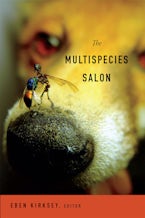"Shines a valuable light on the crucial but understudied question of human relationships with non-human beings."
- Jack David Eller (Anthropology Review Database) “Eben Kirksey's wonderful new volume is an inspiring introduction to a kind of multispecies ethnography where artists, anthropologists, and others collaborate to create objects and experiences of great thoughtfulness and beauty. … This is a volume that I will be returning to, recommending, and assigning for years to come.”
- Carla Nappi (New Books in Science and Technology Studies) “[A]n instant academic hit. Bringing together the voices of many exciting and innovative artists and scholars, the book advocates a radical decentering of anthropocentrism; one surpassing in scope and complexity the reorientations already operated by animal studies over twenty years.”
(Antennae) “Through insouciant writing and art making, multispecies ethnographers push, poke, glean, and poach ideas to confront received wisdoms. What ‘microbiopolitical entanglements’ are possible, they ask, given ‘that 90% of the genetic material in "us" is "not us"' and instead belongs to individual and community biomes? ‘Genre-bending’ topics range from the Rural Alchemy Workshop making soap from human and she-ass milk to harvesting delectable mushrooms in the ‘blasted landscapes’ of thoughtlessly plundered environments and the glories of common weeds to the serpentine symmetries of brittle stars. Patricia Piccinini’s multispecies sculptures interleave the essays in ways that some will find provocative and others distressingly-yet appropriately-unsettling. … Recommended. Upper-division undergraduates and above.”
- A. F. Roberts (Choice) "The volume in general is a fascinating read, and although the contributions have grown out of an art exhibit that evolved as it traveled from San Francisco to New Orleans and later to New York City, the book works well on its own and can already be regarded as a core work"
- Jon Henrik Ziegler Remme (Journal of the Royal Anthropological Institute) "What's more revolutionary than contemplating the rights and interconnectedness of plants, animals, fungi, even microbes - and then aspiring to a more expansive post-humanist society? This collection's contributors include such radical thinkers as Karen Barad and Donna Haraway. Reading it, my heart enlarges and my mind breaks free of its ruts."
- Lydia Peelle (The Week) "The Multispecies Salon develops a conversation around the possibilities for multispecies thinking and, as the text argues, we can harness these multispecies relationships to inform epistemological projects that work through nature/culture/social crisis. The nuanced arguments in each article forge exciting pathways toward a modest hope that, however encouraging, would seem to require greater political organizing to generate social change. However, the anthology’s willingness to push, poach, and creatively practice its critical politics surrounding disaster landscapes, pathogens, and ethics makes the multispecies methodology so resonant for our tumultuous environmental, political, and social times that often lack hope."
- Samantha Ashton Hogg (Canadian Journal of Communication)


